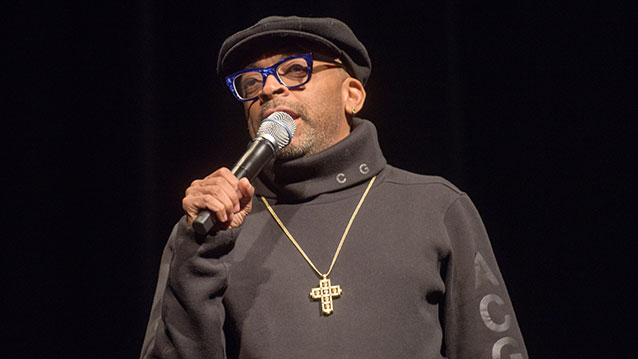EVANSTON, Ill. --- Filmmaker Spike Lee engaged in a frank and sometimes heated discussion about his shot-in-Chicago film “Chi-Raq” with Northwestern University community members who filled Cahn Auditorium first for the movie’s screening and then to hear what the leading filmmaker had to say about the volatile subject matter of his film.
Raw realities about gun and gang violence were brought home by two young men, Curtis Toler and Brandon Jackson, who joined him on stage, to share their personal stories about what it’s actually like to live in the area that was the focus of the film and where dying young is a way of life.
Father Michael Pfleger, the activist white priest of Chicago’s mostly African American St. Sabina Parish who has been a fierce advocate for the young men on stage and fellow parishioners as well the model for a character in Lee’s film, was in the audience. He was cited time and again by Lee, Toler and Jackson.
Lee referred to the young men as “two soldiers” in his opening remarks, citing devastating statistics about homicides in Chicago, even as the film was being made, including the murder of Jackson’s brother.
Lee also addressed the criticism he has gotten for using satire to tell a story about the devastation that gun violence has caused poor African American communities.
He acknowledged that criticism plays a necessary role in ascertaining the quality of filmmaking. But he took issue with criticism related to using satire to deal with serious subjects, such as he did with “Chi-Raq.”
Chicago-area mothers who lost children to gun violence, including those in the audience, would never have agreed to participate in the film if they thought the movie made a mockery of their loved ones, Lee stressed.
Hosted by the Northwestern’s department of political science, the dean of Weinberg College of Arts and Sciences and the student-run Contemporary Thought Speaker Series (CTSS), the evening’s event sparked intense discussion.
“Spike was able to inspire a really interesting conversation on topics ranging from the use of race in film to community development strategies on the South Side,” said Ben Zimmerman, co-chairman of CTSS. “His own story, as well as the experiences of the local activists who spoke with him, generated a ton of buzz on campus and started important discussions on such timely topics, which is exactly what we hoped to get out of the event.”
Among the wide-ranging questions from the audience, members of the Northwestern community asked Lee about his portrayal of black women in “Chi-Raq” and his reason for making the movie in the first place.
“I wanted to bring light to this epidemic that many people in the world do not know about,” Lee said in response to an audience member who asked about the goal of his film.
“Chi-Raq” comes from a nickname for Chicago that likens conditions in some neighborhoods to war zones in Iraq. The movie is structured as an adaptation of Aristophanes’ “Lysistrata,” a masterpiece of ancient Greek comic drama that has inspired peace activists both in the United States and abroad for years.
“The ancient play was satire in rhythmic speech and song about a sex strike by women to force men to make peace,” said Sara Monoson, chair of the department of political science at Northwestern. “It was full of obscenities, hilarious antics and was also deadly serious about male violence. ‘Chi-Raq’ was both remarkably faithful to the spirit of the original play and fiercely in the moment today, as the intense discussion demonstrated. The way the evening brought antiquity into the 21st century was electrifying.”
Trevia Daniels, a student in Northwestern’s School of Professional Studies, grew up on Chicago’s South and West sides and said she’s very familiar with the issues that plague those communities. She encouraged the Northwestern community to get involved.
“We are living in a perilous time, for not only our city, but for our nation and our world,” Daniels said. “I expect Northwestern Wildcats…or wherever you come from, to be the change that you wish to see in the world.”


